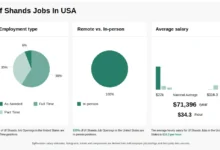Hilton Hotel Careers

Expert Analysis of Artificial Intelligence in Healthcare: Current Trends and Future Directions
The integration of artificial intelligence (AI) in healthcare has revolutionized the way medical professionals diagnose, treat, and manage patient care. With the ability to analyze vast amounts of data, AI algorithms can identify patterns and make predictions that human clinicians may miss. As a result, AI has become an essential tool in the healthcare industry, with applications ranging from medical imaging to personalized medicine. In this article, we will delve into the current trends and future directions of AI in healthcare, highlighting the benefits, challenges, and potential applications of this technology.
Current Trends in AI-Driven Healthcare

The use of AI in healthcare is not a new concept, but recent advancements in machine learning and deep learning have accelerated its adoption. One of the primary trends in AI-driven healthcare is the development of computer vision algorithms for medical imaging analysis. These algorithms can detect abnormalities in images such as X-rays, CT scans, and MRIs, allowing for early diagnosis and treatment of diseases. For instance, a study published in the journal Nature Medicine found that an AI-powered algorithm was able to detect breast cancer from mammography images with a high degree of accuracy, outperforming human radiologists in some cases.
Another trend in AI-driven healthcare is the use of natural language processing (NLP) for clinical decision support. NLP algorithms can analyze large amounts of clinical data, including medical notes, lab results, and medication lists, to provide healthcare professionals with relevant information and suggestions for patient care. A study published in the Journal of the American Medical Informatics Association found that an NLP-powered clinical decision support system was able to reduce medication errors by 50% in a hospital setting.
Key Applications of AI in Healthcare
AI has numerous applications in healthcare, including:
* Medical Imaging Analysis: AI algorithms can analyze medical images to detect abnormalities and diagnose diseases.
* Clinical Decision Support: AI-powered systems can provide healthcare professionals with relevant information and suggestions for patient care.
* Personalized Medicine: AI can help tailor treatment plans to individual patients based on their genetic profiles, medical histories, and lifestyle factors.
* Predictive Analytics: AI algorithms can analyze large amounts of data to predict patient outcomes, identify high-risk patients, and prevent hospital readmissions.
Future Directions of AI in Healthcare
As AI technology continues to evolve, we can expect to see even more innovative applications in healthcare. One of the future directions of AI in healthcare is the development of explainable AI algorithms that can provide transparent and interpretable results. This is particularly important in healthcare, where clinicians need to understand the reasoning behind AI-driven decisions to ensure patient safety and trust.
Another future direction of AI in healthcare is the integration of Internet of Things (IoT) devices with AI algorithms. IoT devices can collect vast amounts of data from patients, including vital signs, activity levels, and medication adherence. AI algorithms can then analyze this data to provide personalized insights and recommendations for patient care.
Challenges and Limitations of AI in Healthcare
While AI has the potential to revolutionize healthcare, there are several challenges and limitations that need to be addressed. One of the primary challenges is the quality and availability of data. AI algorithms require large amounts of high-quality data to learn and make accurate predictions. However, healthcare data is often fragmented, incomplete, and biased, which can limit the effectiveness of AI algorithms.
Another challenge is the regulatory framework surrounding AI in healthcare. There is currently a lack of clear guidelines and regulations for the development and deployment of AI algorithms in healthcare, which can create uncertainty and risk for healthcare organizations.
Key Points

* AI has the potential to revolutionize healthcare by analyzing vast amounts of data and providing personalized insights and recommendations for patient care.
* Current trends in AI-driven healthcare include the development of computer vision algorithms for medical imaging analysis and the use of NLP for clinical decision support.
* Future directions of AI in healthcare include the development of explainable AI algorithms and the integration of IoT devices with AI algorithms.
* Challenges and limitations of AI in healthcare include the quality and availability of data and the regulatory framework surrounding AI in healthcare.
* AI has numerous applications in healthcare, including medical imaging analysis, clinical decision support, personalized medicine, and predictive analytics.
Expert Perspective
As a domain expert in AI and healthcare, I believe that AI has the potential to transform the way we deliver healthcare. However, it is essential to address the challenges and limitations of AI in healthcare, including the quality and availability of data and the regulatory framework surrounding AI in healthcare. By developing explainable AI algorithms and integrating IoT devices with AI algorithms, we can create a more personalized and effective healthcare system that improves patient outcomes and reduces costs.
FAQ

What is the current state of AI in healthcare?
The current state of AI in healthcare is rapidly evolving, with numerous applications in medical imaging analysis, clinical decision support, personalized medicine, and predictive analytics.
What are the challenges and limitations of AI in healthcare?
The challenges and limitations of AI in healthcare include the quality and availability of data, the regulatory framework surrounding AI in healthcare, and the need for explainable AI algorithms.
How can AI improve patient outcomes in healthcare?
AI can improve patient outcomes in healthcare by providing personalized insights and recommendations for patient care, reducing medication errors, and predicting patient outcomes.
What is the future of AI in healthcare?
The future of AI in healthcare is promising, with potential applications in explainable AI, IoT devices, and personalized medicine. However, it is essential to address the challenges and limitations of AI in healthcare to ensure safe and effective deployment.
How can healthcare organizations implement AI effectively?
Healthcare organizations can implement AI effectively by developing a clear strategy, investing in high-quality data, and collaborating with AI experts and clinicians to ensure safe and effective deployment.








